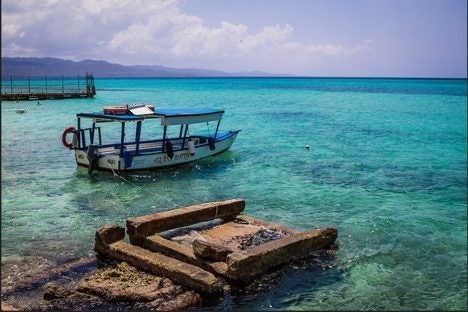Montego Bay, Jamaica – Photo by Ramon Zamora
Did you know that the Caribbean is a place where 70 percent of those who fish or work on the waters do not even know how to swim? In fact, some in the Caribbean see the Sea as more foe than friend.
Over the past few years, the term “Blue Economy” has gained traction. For some, it refers to any economic activity in the maritime sector, whether sustainable or not. Here at the IDB, the Blue Economy means the use of the sea and its resources for sustainable economic development, while significantly reducing environmental risks and ecological scarcities.
The Caribbean Sea is an eco-system that both divides and unites 36 countries making it a challenge to administer the related resources. A paradigm shift in the Caribbean is essential so people feel a sense of ownership and a greater connection to their Sea. One way of looking at this is to think of the Caribbean not just as a group of islands or countries but as a group of eco-systems with the sea as its main system. This could help us develop a more coherent and integrated approach to managing the economic development of the sea.
Unfortunately, although the Caribbean Sea provides jobs and nutrition, it is under pressure from human activities and is being further threatened by development approaches that are fragmented, uncoordinated and often in conflict with what science tells us is possible or ecologically sound.
How is the IDB addressing the sustainability of the Blue Economy?
On June 22, 2016, the IDB’s Caribbean Country Department (CCB) and the Institute of Caribbean Studies (ICS) held a meeting with members of the Caribbean diaspora to initiate a paradigm shift in development thinking in this area.
Photo by Carina Cockburn
IDB has focused on several “blue economy” opportunities including marine tourism industries, coastal zone management, renewable energy, and sustainable housing and infrastructure. IDB’s Michael Donovan, a Housing & Urban Development Senior Specialist, is currently working on Coastal Cities Programs. His most recent work, The State of Social Housing in Six Caribbean Countries was distributed at the event. Greg Watson, a lead Specialist at the Multilateral Investment Fund (MIF), detailed how they are working closely with the private sector on innovative projects including the production of sponges in the Bahamas. This involves simple training of divers to remove sponge by cutting rather than pulling, which allows the sponge to regenerate and become a sustainable industry. Gerard Alleng, a Climate Change Senior Specialist, spoke about what the IDB is doing to address climate change and indicated that effective management of the Blue economy in an integrated manner would help countries meet their commitments made in France.
Source: Michelle Evans
Members of the diaspora spoke about the links between the blue economy and other areas of interest to the region including (i) the green economy in Guyana focusing on the ongoing implementation of their Low Carbon Development Strategy and the expansion of eco-tourism there; (ii) maritime education offered through the Caribbean Maritime Institute, which provides opportunities to young people from poor communities and helps to strengthen the capacity of fishermen and other maritime workers; (iii) the orange economy and the need to mainstream arts education in schools, place music within a historical context, build on similarities in culture in countries that share the Caribbean basin and transform the arts into a net income earner for the region; and (iv) facilitating learning across countries using technology as the base for educational programs while attracting students and businesses to come to the region.
Now that the conversation on the blue economy has started, it is clear that the diaspora is thinking about how their relationship, intellectual, and remittance capital can be harnessed to assist in making the needed paradigm shift. In the face of climate change and the need to find new paths to prosperity, this is a vital start to identifying a shared vision for achieving the UN Sustainable Development Goals and an inclusive prosperous Caribbean.




Leave a Reply